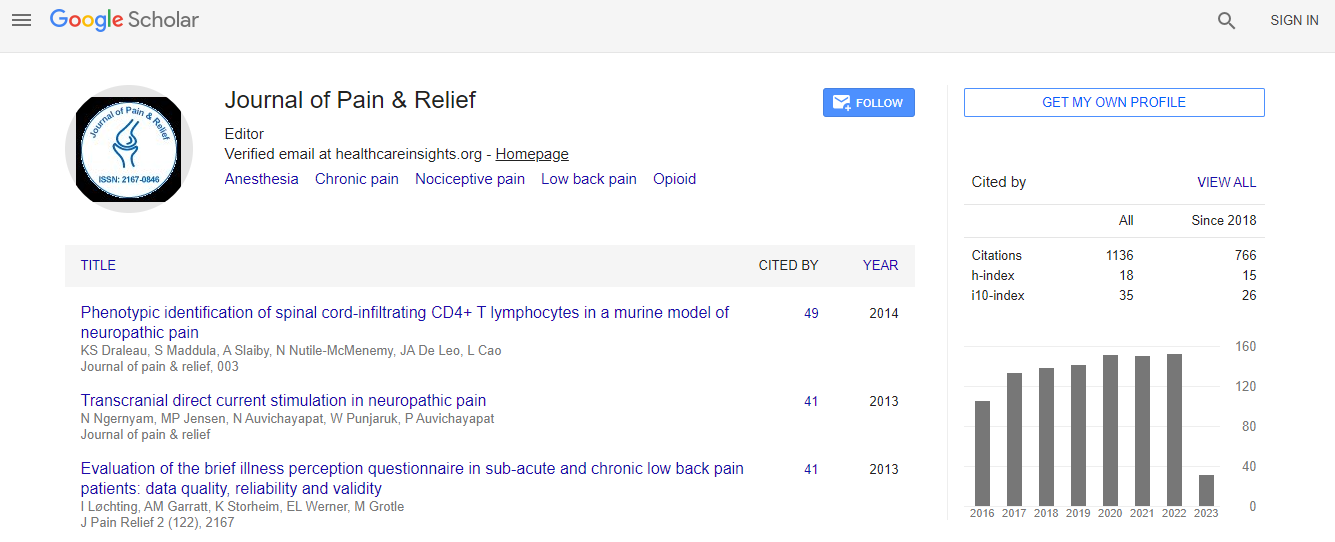Our Group organises 3000+ Global Conferenceseries Events every year across USA, Europe & Asia with support from 1000 more scientific Societies and Publishes 700+ Open Access Journals which contains over 50000 eminent personalities, reputed scientists as editorial board members.
Open Access Journals gaining more Readers and Citations
700 Journals and 15,000,000 Readers Each Journal is getting 25,000+ Readers
Recommended Conferences
42nd Global Conference on Nursing Care & Patient Safety
Toronto, CanadaGoogle Scholar citation report
Citations : 1556
Journal of Pain & Relief received 1556 citations as per Google Scholar report
Journal of Pain & Relief peer review process verified at publons
Indexed In
- Index Copernicus
- Google Scholar
- Open J Gate
- Genamics JournalSeek
- Cosmos IF
- RefSeek
- Hamdard University
- EBSCO A-Z
- OCLC- WorldCat
- Publons
- Geneva Foundation for Medical Education and Research
- Euro Pub
- ICMJE
Useful Links
Recommended Journals
Related Subjects
Share This Page
Artificial intelligence for cyber security applications
3rd International Conference on Primary Healthcare and Pain Management
Farah Jemili
University of Sousse, Tunisia
ScientificTracks Abstracts: J Pain Relief
Abstract
The recent White House report on artificial intelligence (AI) highlights the importance of AI and the need for a clear roadmap and strategic investment in this area. As AI emerges from science fiction to become the frontier of world-changing technologies, there is an urgent need to systematically develop and implement AI to see its real impact in diverse fields of study. This paper offers a contribution to the deployment of AI for cybersecurity applications. Intrusion detection has been the subject of numerous studies in industry and academia, but cybersecurity analysts still want a greater accuracy and comprehensive threat analysis to secure their systems in cyberspace. Improvements to intrusion detection could be achieved by adopting a more comprehensive approach in monitoring security events from many heterogeneous sources. Merging security events from heterogeneous sources and learning from data can offer a more holistic view and a better knowledge of the cyber threat situation. A problem with this approach is that at present even a single event source (for example, network traffic) can encounter big data challenges when it is considered alone. Attempts to use more heterogeneous data sources poses far greater challenges. Artificial Intelligence and Big Data Technologies can help solve these heterogeneous data Problems. The proposed approach includes the pre-processing of data and learning. The experimental results show effectiveness of the approach in terms of accuracy and detection rate and prove that Artificial Intelligence I can help achieve better results in Cyber Security context.Key words: Artificial Intelligence, Cyber Security.Biography
Farah Jemili had the Engineer degree in Computer Science in 2002 and the Ph.D degree in 2010. She is currently Assistant Professor at Higher Institute of Computer Science and Telecom of Hammam Sousse (ISITCOM), University of Sousse, Tunisia. She is a senior Researcher at MARS Laboratory (ISITCOM –Tunisia). Her research interests include Artificial Intelligence, Cyber Security, Big Data Analysis, Cloud Computing and Distributed Systems. She served as reviewer for many international conferences and journals. She has many publications; 6 book chapters, 6 journal publications and more than 20 conference papers. Research Interests: Artificial Intelligence, Cyber Security, Big Data Analysis, Cloud Computing and Distributed Systems.

 Spanish
Spanish  Chinese
Chinese  Russian
Russian  German
German  French
French  Japanese
Japanese  Portuguese
Portuguese  Hindi
Hindi 
